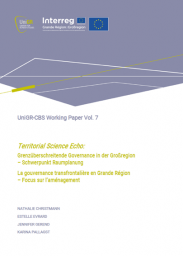Working Paper Vol. 7

This Territorial Science Echo highlights essential facets of governance that may prove relevant for the future development of the Greater Region. In particular, it shows how thematic cooperation and conflicts contribute to the establishment of governance structures. The paper deals with the topics of governance in general, participation and housing as well as the external relations of the Greater Region, formulates essential challenges and recommendations, and is thus to be understood as a suggestion in the professional discourse for the further design of the spatial development concept of the Greater Region.

